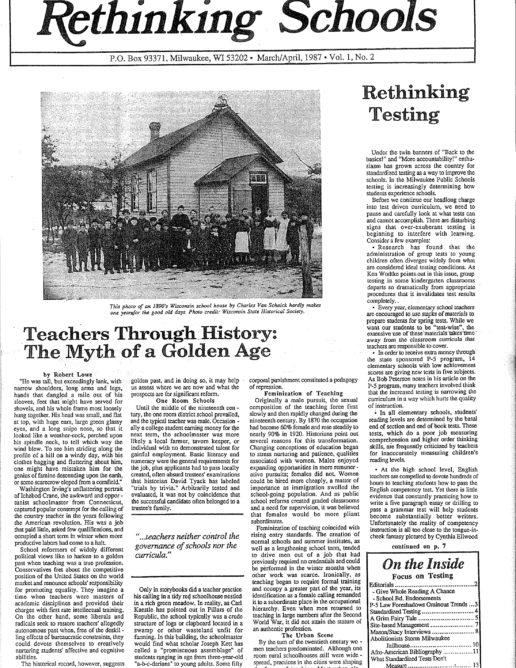Basal Adoption
Make the Whole Book Approach a Real Choice
It’s not often teachers are offered a free dinner. But that is just what basal textbook companies are offering in Milwaukee as they court teachers in anticipation of the upcoming adoption of a new basal reading series. This is the sixth year that the Scott Foresman Basal has been used. By the end of next year a decision will be made on whether to keep it or adopt a new one.
We at Rethinking Schools believe that instead of choosing between Tweedle Dee and Tweedle Dum, the whole basal approach to the teaching of reading should be challenged. For those educators committed to teaching reading through a whole language approach, the upcoming debate on “which basal” will provide an excellent opportunity to organize and be heard.
In our last issue we criticized basal readers for featuring short, boring selections, over-emphasizing lower level thinking skills and replacing reading with skill instruction and drills.
Some educators claim we need a basal because of the high mobility of the student population. With a uniform basal series in all schools a new student can be fit immediately into the proper reading group saving valuable teacher time, they argue. This appears logical, but in reality most teachers give a new student an informal reading inventory of some sort. All elementary teachers know that just because the computer printout from Central Office says a child is reading, for example, on a fourth grade level in the Sea Treasures book, the child’s actual reading ability could be quite different. It could be a couple of grade levels lower (maybe the student’s previous teacher emphasized the skills that were on the test — or maybe the kid was pushed through a third grade reader in six short weeks of summer school), or a couple of grade levels higher (how many times have we been told not to pace a student so they end up above level?). Sound educational practice would encourage the reliance on the professional opinion of the child’s new teacher, not the ink off of some Central Office printout.
The second argument in defense of the basal is that there is no workable alternative — at least not for inexperienced teachers or for more mediocre or less energetic teachers. How else would a whole range of reading skills be taught if not for the systematic scope and sequence of a basal series? Yet, alternatives do exist. Many schools, like Crestwood Elementary School in Madison have been able to teach necessary skills using a whole book approach with children reading lots of books, doing research and learning to love literature.
A school system the size of Milwaukee could surely develop a whole language approach to reading that would cover the range of necessary skills. But even if the school system fails to do that, should the quality of materials and teaching of the more creative and energetic teachers be brought down to the level of the most mediocre?
Moreover, we believe most teachers — new teachers, burned out teachers, not so good teachers if offered a whole book approach would have more success in teaching reading than they would by using the basal.
Hard questions remain. Why not adopt a whole language and whole book approach to reading? If that can’t be done on a system wide basis, why not make a whole book approach a real choice for teachers? Put some of the astronomical sums of money spent on workbooks, masters, and basal books into building huge, quality paperback libraries in individual classrooms and expanding the elementary school libraries. Why not hire classroom teachers to develop a whole book curriculum this summer?
Parents, we encourage you to ask frank questions about the reading program in your child’s school and then to encourage School Board members to rethink reading instruction in MPS. How many minutes each day does your child actually read in school? (The National Academy of Education recommended in its report Becoming a Nation of Readers that 3rd and 4th graders read independently a minimum of 120 minutes per week.) What are the incentives in your child’s school to read whole books? What does your School Board representative think about the basal reader versus a whole book approach?
We call on School Board members and the administration to open up the basal selection process and consider whether a new basal should be chosen at all. We believe it would be in the interest of the children of Milwaukee to dispose of the basal series and develop sounder approaches to the teaching of reading.

